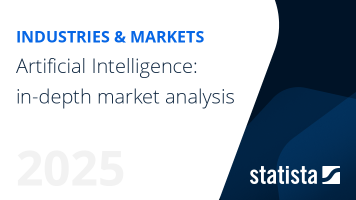Artificial Intelligence - Israel
Israel- The market size in the Artificial Intelligence market is projected to reach US$1.26bn in 2025.
- The market size is expected to show an annual growth rate (CAGR 2025-2031) of 26.22%, resulting in a market volume of US$5.11bn by 2031.
- In global comparison, the largest market size will be United States (US$73.98bn in 2025).
Definition:
Artificial intelligence (AI) is a branch of computer science that focuses on creating machines able to perform tasks traditionally requiring human intelligence, such as perception, reasoning, and learning. The Artificial Intelligence (AI) market includes a wide range of applications, such as speech recognition, image processing, and autonomous vehicles and has seen rapid growth in recent years due to advancements in technology and increased investment. The Artificial Intelligence (AI) market includes software, hardware, and services that enable organizations to develop and deploy AI applications.
Structure:
The Artificial Intelligence (AI) market is structured into six markets based on the technology:
- The Computer Vision market covers applications that enable computers to interpret and understand digital images and video data.
- The Machine Learning market covers the use of algorithms to enable computer systems to learn from data.
- The Natural Language Processing market covers applications that enable computers to understand, interpret, and generate human language.
- The Artificial Intelligence Robotics market covers the combination of AI, machine learning, and engineering to create intelligent machines that can perform tasks autonomously.
- The Autonomous & Sensor Technology market covers machines and systems that operate independently by using sensors, AI, and machine learning to respond to changes in their environment.
- The Generative AI market covers artificial intelligence that involves creating models capable of generating new content, such as images, videos, and text, which are indistinguishable from content created by humans.
Additional Information:
The Artificial Intelligence (AI) market comprises three key performance indicators: market sizes, market sizes by industry, and users of AI tools. Market sizes are generated by the funding amount of Artificial Intelligence (AI) companies. Key players of the Artificial Intelligence (AI) market include companies such as Google, Open AI, IBM, and Microsoft.
For more information on the data displayed, use the info button right next to the boxes.
- Natural language processing tools, such as chatbots and speech recognition
- Computer vision applications, such as object detection or face recognition
- Machine learning tools, such as trained algorithms.
- Robotics hardware, such as hardware used to build robots
- Enterprise resource planning (ERP) software, such as SAP
- Web development services, such as services intended for coding and designing websites.

Market Insights report







